|
1 Canterbury Road / Belmont Road / 1 Swan Terrace / 1
Upper High Street 1871
Whitstable
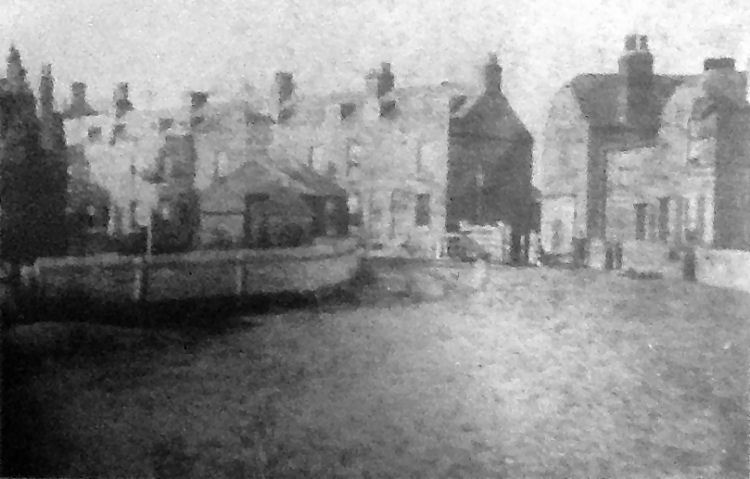
Above photo is possibly the oldest taken of Whitstable pre 1860. The
white gate is where Belmont Road is today. The row of three houses,
Hartsfield Terrace was demolished in 1860 for the wooden railway bridge
built to take the new LCDR to Ramsgate. These houses were rebuilt and
are still there in Swanfield Rd., behind the pub.
To the right of the white gate is the building that became part of
the "Railway Inn." It is unknown whether it was functioning as an inn
then.
The small building in the middle of the scene it the Tollgate as this
was the Turnpike Road to Canterbury. |
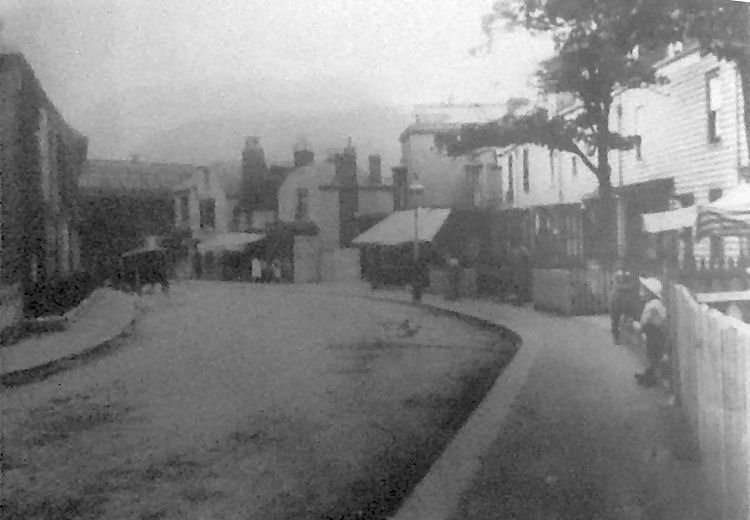 : :
Above photo roughly the same view in 1904. The Tollgate has been removed
and rebuilt where it stands today at the junction of Joy Lane. The
building next to the bridge has been extended and is as we know it
today. |
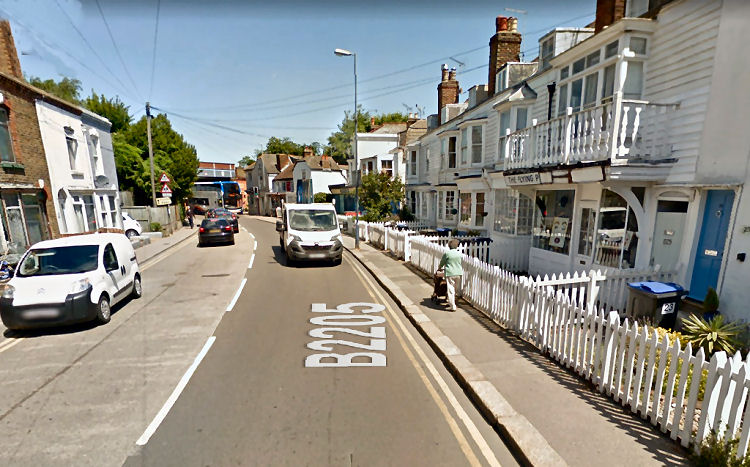
Above Google image showing the same location, June 2017. The pub, of
course is to the right of the bus passing under the bridge. |
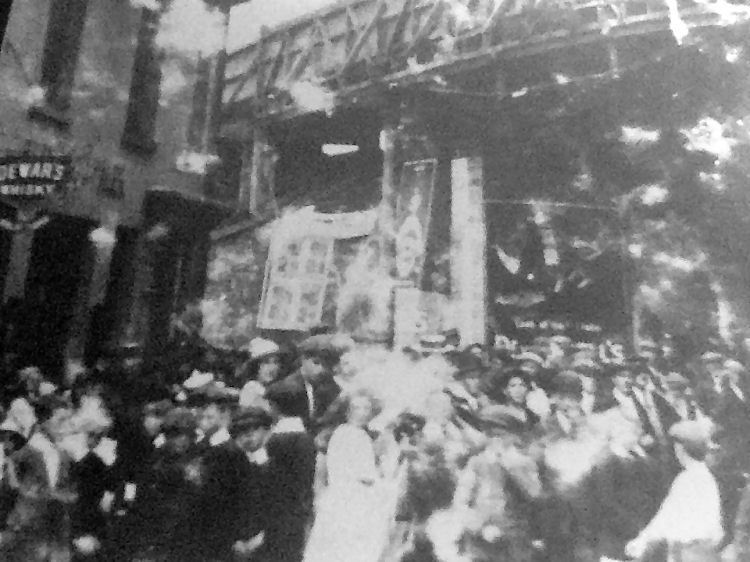
Above photo, 1914, calling up Navy Reserves outside the "Railway Inn," |
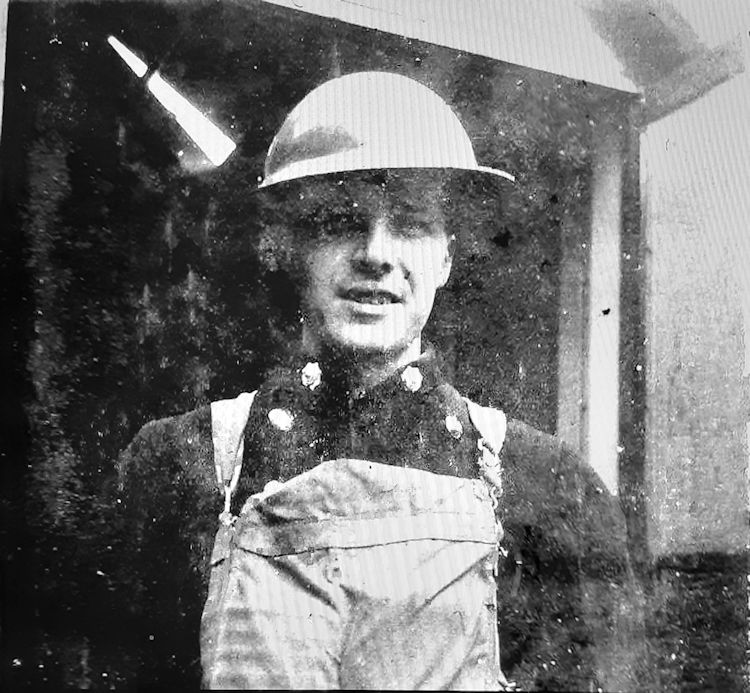
Above photo, showing Sibert Rigden, uncle to Eric Fisher who sent this
photo saying he was the landlord and what also looks like a warden or
perhaps in the fire brigade during the second world war. |
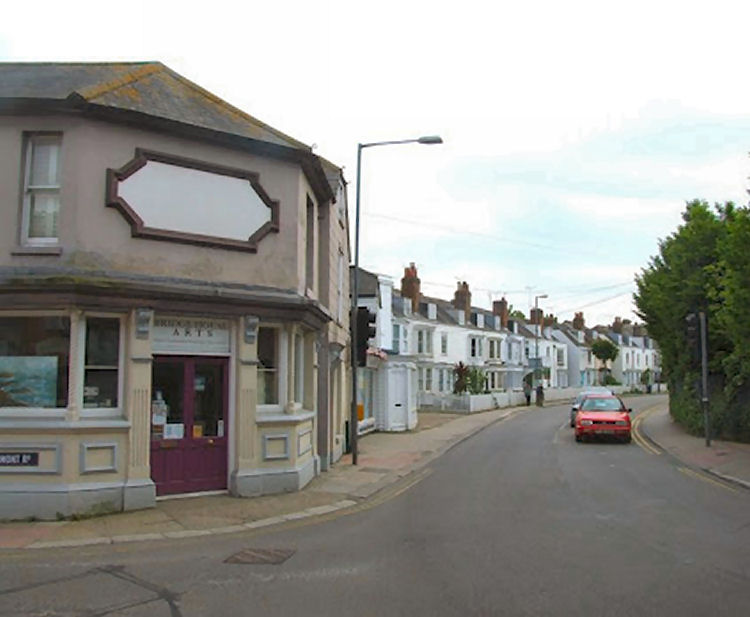
Above photo, date unknown, kindly sent by Garth Wyver. |

Above photo August 2017, taken and sent by Steve Glover. |
|
|
|
South Eastern Gazette, 4 September, 1860.
ST. AUGUSTINE’S PETTY SESSIONS. Saturday.
(Before W. Slarke, W. Plummer, G. Neame, and . Wynn Ellis, Esqrs.)
This was the annual general licensing day for the various
public-houses situate within the Home Division. All the old licenses
were renewed, and it is due to the respective landlords to state
that out of the entire number only about two complaints had been
made daring the past year, and they were only of a trifling
character. There were six applications for new licenses, viz:—
Wm. Madams, for the "Railway Tavern," Whitstable. Mr. Tassell, of
Faversham; appeared to support the application, which was granted.
|
|
From the Kentish Chronicle, 18 July, 1863.
DEATH FROM DROWNING.
On Monday afternoon, Mr. W. P. Callaway, deputy coroner, and a
respectable jury, held an inquest, at the house of Mr. William Madams
the “Railway Inn,” Whitstable, on the body of Edward Gostick (who had
been staying with his brother, a grocer in the town) who was drowned on
Sunday morning under circumstances which will be best gathered from a
perusal of the evidence adduced.
Thomas Henry Lockwood, of Whitstable, carpenter, deposed:- I have known
deceased about eight or nine weeks. Yesterday morning about a quarter
past eight I was with him on the beach bathing; there were three of us;
deceased’s brother was with us. We were bathing on the Herne Bay side of
the street. The tide was then almost high. Deceased was the first to go
into the water. He went about 80 yards out and stood still; the next I
saw of him I believed him to have been out of his depth. I was then
almost close to him and found myself out of depth. I then swam up to
him; he made no remark about being out of his depth. About a minute
afterwards he shouted, I was then close to him, and grasped him, I
endeavoured to bring him ashore. The top tide was coming in and the
underneath ashore. The top tide was corning in and the underneath was
going out. We both went under the water. I found I could not bring him
ashore, and I was in danger of being drowned, and I left him under the
water. I then swam to shore. I went for a boat. I never saw him again. A
coast-guard and another man would not let me have the bout, as I was
naked. I then came to his brother, and on my return the const-guard men
were in a boat, and they drew the body from the sea. The deceased was in
the water about ten minutes before I knew he was out of his depth. The
deceased could not swim, I have never bathed with him before. Before
going into the water he said the place was very flat, and anyone could
go out a long distance without being drowned, he rushed in the water
very quickly.
By a juror:- His brother cannot swim and therefore could not render
deceased any assistance.
James Searle, of Tankerton Station, commissioned boatman, deposed:- I
was standing on the hill above Tankerton Tower, about a quarter or
half-past eight yesterday morning, and saw the three men go down the
beach, and saw them go into the water. They went into the water about
forty yards to the east of the Street. At first they did not go out of
their depth. As the deceased was on the Street up to his chin he went to
the westward off the Street, and directly got out of his depth and sank,
and I did not see him alive again. In two or three strides there is an
increase of six feet of water. I was told he could not swim, and with
others I went in a boat. About two hours and 50 minutes after he sank we
found the body, I took him from the water with a boat-hook, which caught
him under the left arm. He was quite dead when we found him. The
coast-guard rendered all the assistance he could, and as soon as
possible.
This being the whole of the evidence, the deputy coroner summed up, and
the jury returned a verdict of “Accidentally drowned.”
Too much praise cannot be given to Mr. J. Peare, chief officer of the
Coast Guard Station at Tankerton, and his crew for their indefatigable
exertions to recover the body—but unfortunately nearly three hours had
elapsed before they succeeded in their mission of humanity.
|
|
Whitstable Times and Herne Bay Herald, 12 March 1870.
RAPE AT WHITSTABLE.
At the Kent Lent Assize, on Wednesday, John Spratt, Frederick Page,
Henry Thomas Kirkcaldy, 16, sea apprentice, and William Godden, 21,
labourer, were indicted for a rape upon Mary Hockless, at Whitstable, on
the 26th September, 1869.
Mr. E. T. Smith prosecuted and opened the case at some length, stating
the facts which will be found in the following evidence:-
Mary Hockless said her husband resided at Whitstable and was named
Thomas Hockless. On the 26th September she was at the "Railway Inn,"
where she had a glass of beer and some bread and cheese. She left there
about twenty minutes to twelve, and when near the "Two Brewers" she met
five or six young men, four of whom she saw in the dock. They set upon
her and dragged her over the stile in the meadow. She screamed out. She
knew Godden, Spratt, and Page before, but she did not know the other
prisoner. They threw her down on the ground and stopped her mouth with
their fists, and each of the prisoners committed a rape upon her. She
was on the ground for about three-quarters of an hour, and after the
prisoners had left she remained there for an hour or two as she was very
ill afterwards. She said to Godden, who was the only one she recognised
after the offence had been committed, "Oh dear, young Godden, are you
here," when he laughed and exclaimed that witness knew him. She reached
home about four o'clock in the morning and gave information to the
police about twelve.
Cross-examined by Mr. Barrow, who defended Spratt and Page.— She was the
worse for liquor when she left the "Railway Inn." It was on the road
between the "Railway Inn" and the "Two Brewers" that the young men met
her. She lived opposite the "Two Brewers," but that was not were she was
assaulted. She had not till now said she knew the four prisoners. When
before the magistrates she only said she knew Godden. When before the
magistrates she said all six of the young men had connection with her
and not four as stated on the depositions. She did not say a word to her
husband about it when she got home.
Cross-examined by Godden.— She did not apply to him for protection nor
did she say her husband had locked her out so she could not go home.
Cross-examined by Kirkcaldy.— She did not remember seeing the prisoners
buying pears out of a cart, nor did she remember lying down drunk.
By the Judge.— She identified Godden by his clothes.
Re-examined by Mr. E. T. Smith.— When she said before the magistrates
that one by one four had connection with her she was alluding to the
four prisoners then present, but in reality six young men had connection
with her.
Thomas Hockleas said he was a labourer living at Whitstable. On Sunday
morning, the 27th of September, his wife came home between three and
four o'clock in the morning, and he went down stairs and let her in. He
did not take any notice as to whether she was distressed or in good
spirits. Later in the morning he noticed her mouth was swollen and she
was crying, and on his asking her what was the matter she said she had
been assaulted by fire or six young men.
By Mr. Barrow.— Was not aware that his wife was given to liquor. Had
never refused her admission to his house. P.C. Bates, to his knowledge,
had not brought her home drunk forty or fifty times. Could not say he
had never seen her drunk.
Mr. Ladams said he kept the "Railway Inn," and on Saturday night, the
26th September, he remembered Mrs. Hockless being at his house. He
believed she came in about nine and left about a quarter-past eleven.
When she came in she asked for a glass of beer, saying her husband had
turned her out of doors. She was drunk that night, but not so bad as he
had sometimes seen her. The distance between his house and the "Two
Brewers" was something less than a quarter of a mile.
By Mr. Burrow.— Although her husband had never seen her drunk, he had
many a time, and she had been in the habit of being carried home by
boys.
A young man named Edmunds said he lived at Mr. Garraway's house, near
the "Two Brewers." On the night of the 26th September he was awoke by
the screams of a drunken woman. He looked out of the window and saw
about half-a-dozen young men carrying a woman, whom they put over a
stile. He thought he heard Spratt's voice, but could not swear to it. He
did not think whose voice it was at the time, but he afterwards thought
it was Spratt's. The woman kept calling for help. The screams subsided
and he went to bed. Stephen Samson said he kept the "Two Brewers Inn"
and knew Spratt and Page, who were at his house on the night of the 26th
September. They left about twelve o'clock.
By Mr. Barrow.— There was a harvest supper at his house that night and
about forty or fifty persons were there besides the prisoners who all
left at twelve o'clock.
Mr. Mitchell, surgeon at Whitstable, examined the prosecutrix and found
a number of marks about the lower parts of her body. On the thigh there
were some slight bruises. On her chemise he found stains of dirt.
P.C. Tomlin said that on the 27th September he received some information
from the prosecutrix, and apprehended Spratt on a charge of committing a
rape upon her. He said he was not there, and had not seen the woman. He
next apprehended Kirkcaldy, who said the woman was drunk, and they tried
to get her home, but she went into the meadow. He next apprehended Page,
and he said he saw some men lugging a woman about, and he thought Spratt
was one, but as he was so drunk he could not say positively. He charged
them all with Godden at the station collectively, when Godden said he
did not commit the offence. Spratt afterwards mentioned the names of the
prisoners and two others, and said they were all as bad as one another.
This was the case, and the learned counsel having addressed the jury for
the prosecution and defence, his Lordship summed up and remarked upon
the evidence of the prosecutrix, which he thought, considering her being
in a state of intoxication at the time and her prevarications in her
evidence, could hardly be relied upon.
The jury, after a few minutes consultation, returned a verdict of
acquittal in the case of all the
prisoners.
His Lordship said the Jury had found them not guilty. They were all
young men and he cautioned them to let the peril in which they stood be
a warning to them for the rest of their lives. Had they been convicted
of that indictment they would have passed the remainder of their lives
in penal servitude. He then discharged them.
|
|
The Canterbury Journal and Farmers Gazette. Saturday March 13, 1909.
ADJOURNED LICENSING SESSIONS FOR THE HOME DIVISION.
PECULIAR POSITION IN A WHITSTABLE TRANSFER.
Mr. H. M. Mercer appeared on behalf of Mr. Battiscombe to apply for the
transfer of the "Railway Inn," Whitstable, from John Carden to Mrs.
Elizabeth Grace Johnson (widow).
Mr. Carden raised some objection to the transfer and said he did not
know why he had been given notice by the brewers (Messrs. Flint and
Co.).
It was put to Mr. Carden that he had signed the notice agreeing to the
transfer, and he said that he did not know what he was signing.
Mr. Ben Twymnn, who was the valuer in the case for Mr. Carden, said the
notice was read to Mr. Carden. He supposed the brewers had sufficient
reason for giving Mr. Carden notice, or they would not have done so. He
was unable to give the reason. Mr. Carden had been in the house for
eight or nine years. His tenancy, according to the notice, expired on
the 5th. |
Not to be confused with the "Railway
Tavern" this was originally a Flints tied house, later to become
Fremlins.
This was probably an Inn next to the tollgate and was extended and
renamed when the London, Chatham and Dover Railway was built alongside. The
Whitstable Station being temporarily nearby. As yet I do not know what the
name was.
Further information from Christopher Richford says the following:- Being
on the corner of Canterbury Road and what is now called Belmont Road the pub
extended into Belmont Road. Belmont was formerly Swan Terrace/Swanfield
leading to Church Road and was probably a marsh area for drainage of the
higher ground south of the town.
LICENSEE LIST
MADAMS William 1861-63+ (also grocer age 42 in 1861 ) )

LONG George to May/1867

MADAMS William May/1867-71 (age 52 in 1871 ) )

BEST John 1874+
GILES Richard 1881-1901 (age 58 in 1901 ) )
CARDEN John 1900-Mar/1909 (age 57 in 1901 ) )

JOHNSON Elizabeth Grace 1911-13+ (widow age 50 in 1911 ) )
REED Percy 1913-37

MITCHELL Alfred 1938-39+ (age 33 in 1939)
RIGDEN Sibert ????
https://pubwiki.co.uk/RailwayInn.shtml
 Whitstable Times
and Herne Bay Herald Whitstable Times
and Herne Bay Herald
 Kentish
Chronicle Kentish
Chronicle
 From the Kelly's Directory 1903 From the Kelly's Directory 1903
 From the Kelly's Directory 1924 From the Kelly's Directory 1924
 Census Census
|

 :
:




